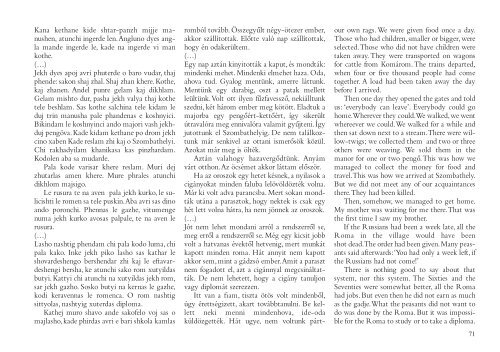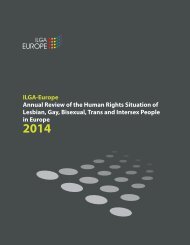You also want an ePaper? Increase the reach of your titles
YUMPU automatically turns print PDFs into web optimized ePapers that Google loves.
Kana kethane kide shtar-panzh mijje ma -<br />
nushen, atunchi ingerde len. Angluno dyes ang -<br />
la mande ingerde le, kade na ingerde vi man<br />
kothe.<br />
(…)<br />
Jekh dyes apoj avri phuterde o baro vudar, thaj<br />
phende: sakon shaj zhal. Shaj zhan khere. Kot he,<br />
kaj zhanen. Andel punre gelam kaj dikh lam.<br />
Gelam mishto dur, pasha jekh valya thaj kothe<br />
tele beshlam. Sas kothe salchina tele ki dam le<br />
duj trin manusha pale phandenas e koshnyici.<br />
Bikindam le koshnyinci ando majori vash jekhduj<br />
pengöva. Kade kidam kethane po drom jekh<br />
cino xaben Kade reslam zhi kaj o Szombathelyi.<br />
Chi rakhadyilam khanikasa kas pinzhardam.<br />
Kodolen aba sa mudarde.<br />
Pala kode varisar khere reslam. Muri dej<br />
zhu tarlas amen khere. Mure phrales atunchi<br />
dikh lom majsigo.<br />
Le rusura te na aven pala jekh kurko, le su -<br />
licishti le romen sa tele puskin. Aba avri sas dino<br />
ando poronchi. Phennas le gazhe, vitumenge<br />
numa jekh kurko avosas palpale, te na aven le<br />
rusura.<br />
(…)<br />
Lasho nashtig phendam chi pala kodo luma, chi<br />
pala kako. Inke jekh piko lasho sas kathar le<br />
shovardeshengo bershendar zhi kaj le efta var -<br />
des hengi bersha, ke atunchi sako rom xutyildas<br />
butyi. Kattyi chi atunchi na xutyildas jekh rom,<br />
sar jekh gazho. Sosko butyi na kernas le gazhe,<br />
kodi keravennas le romenca. O rom nashtig<br />
sitty olas, nashtyig xuterdas diploma.<br />
Kathej muro shavo ande sakofelo voj sas o<br />
majlasho, kade phirdas avri e bari shkola kamlas<br />
rom ból tovább. Összegyûlt négy-ötezer ember,<br />
akkor szállítottak. Elôtte való nap szállítottak,<br />
hogy én odakerültem.<br />
(…)<br />
Egy nap aztán kinyitották a kaput, és mondták:<br />
mindenki mehet. Mindenki elmehet haza. Oda,<br />
ahova tud. Gyalog mentünk, amerre láttunk.<br />
Mentünk egy darabig, oszt a patak mellett<br />
leültünk. Volt ott ilyen fûzfavesszô, nekiálltunk<br />
szedni, két három ember meg kötött. El adtuk a<br />
majorba egy pengôért-kettôért, így si került<br />
útravalóra meg ennivalóra valamit gyûjteni. Így<br />
jutottunk el Szombathelyig. De nem találkoztunk<br />
már senkivel az ottani is me rôsök közül.<br />
Azokat már meg is ölték.<br />
Aztán valahogy hazavergôdtünk. Anyám<br />
várt otthon. Az öcsémet akkor láttam elôször.<br />
Ha az oroszok egy hetet késnek, a nyilasok a<br />
cigányokat minden faluba lelövöldözték volna.<br />
Már ki volt adva parancsba. Mert sokan mond -<br />
ták utána a parasztok, hogy nektek is csak egy<br />
hét lett volna hátra, ha nem jönnek az oroszok.<br />
(…)<br />
Jót nem lehet mondani arról a rendszerrôl se,<br />
meg errôl a rendszerrôl se. Még egy kicsit jobb<br />
volt a hatvanas évektôl hetvenig, mert munkát<br />
kapott minden roma. Hát annyit nem kapott<br />
akkor sem, mint a gádzsó ember. Amit a paraszt<br />
nem fogadott el, azt a cigánnyal megcsináltatták.<br />
De nem lehetett, hogy a cigány tanuljon<br />
vagy diplomát szerezzen.<br />
Itt van a fiam, tiszta ötös volt mindenbôl,<br />
úgy érettségizett, akart továbbtanulni. Be kellett<br />
neki menni mindenhova, ide-oda<br />
küldözgették. Hát ugye, nem voltunk párt-<br />
our own rags. We were given food once a day.<br />
Those who had children, smaller or bigger, were<br />
selected. Those who did not have children were<br />
taken away. They were transported on wagons<br />
for cattle from Komárom. The trains departed,<br />
when four or five thousand people had come<br />
together. A load had been taken away the day<br />
before I arrived.<br />
Then one day they opened the gates and told<br />
us: ‘everybody can leave’. Everybody could go<br />
home. Wherever they could. We walked, we went<br />
whereever we could. We walked for a while and<br />
then sat down next to a stream. There were willow-twigs;<br />
we collected them and two or three<br />
others were weaving. We sold them in the<br />
manor for one or two pengô. This was how we<br />
managed to collect the money for food and<br />
travel. This was how we arrived at Szombathely.<br />
But we did not meet any of our acquaintances<br />
there. They had been killed.<br />
Then, somehow, we managed to get home.<br />
My mother was waiting for me there. That was<br />
the first time I saw my brother.<br />
If the Russians had been a week late, all the<br />
Roma in the village would have been<br />
shot dead. The order had been given. Many peasants<br />
said afterwards: ‘You had only a week left, if<br />
the Russians had not come!’<br />
There is nothing good to say about that<br />
system, nor this system. The Sixties and the<br />
Seventies were somewhat better, all the Roma<br />
had jobs. But even then he did not earn as much<br />
as the gadje. What the peasants did not want to<br />
do was done by the Roma. But it was impossible<br />
for the Roma to study or to take a diploma.<br />
71



